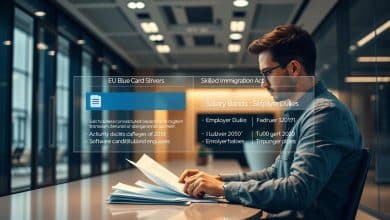Germany Visa Sponsorship: Step-by-Step Application Guide for Foreign Workers
This guide is a key resource for foreign workers, especially those from Nigeria.
It helps them understand the visa sponsorship process in Germany. Knowing the application process well is key to finding work in this European economy.
It covers important topics like who can apply, different visa types, how to apply, and cultural changes. By learning about these, applicants can improve their chances of getting a visa. They can also smoothly adjust to life in Germany.
Understanding Germany Visa Sponsorship
Visa sponsorship is key for non-EU nationals to work in Germany. It means an employer helps with the visa application. This follows strict german visa sponsorship guidelines.
This support lets foreign workers legally find jobs in Germany. It’s a clear way to meet the germany visa requirements for sponsorship.
What is Visa Sponsorship?
Visa sponsorship happens when an employer backs a foreign employee’s work visa. They must show they really need this person because of local job gaps. This is important for those wanting to work in Germany.
Benefits of Visa Sponsorship in Germany
Getting visa sponsorship in Germany has many benefits. It lets foreign workers and their families live and work legally. They can use important services like healthcare and social security.
It’s also a big step towards getting permanent residency. This makes life more stable for individuals and their families in Germany.
Eligibility Requirements for Visa Sponsorship
To apply for a sponsorship visa in Germany, knowing the eligibility criteria is key. There are general and specific requirements for each job. These ensure candidates are ready for the work environment in Germany.
General Eligibility Criteria
Applicants need to meet several basic requirements. First, having a job offer from a German employer is crucial. They should also have the right education or certifications for their job. Knowing German can also help strengthen an application.
Specific Qualifications Based on Occupation
Each job has its own set of requirements for a visa. For example, engineering or healthcare jobs might need specific degrees. It’s important for applicants to check the job description for the exact qualifications needed. This helps in following the steps for getting a sponsored visa in Germany and increases the chances of approval.
Types of Work Visas Available in Germany
Understanding the work visa options in Germany is vital for foreign workers. There are various visa categories for different professional needs. This helps applicants find the best match for their skills and goals. Knowing these types is crucial for those seeking visa sponsorship for Germany and sponsoring a visa application.
Overview of Popular Visa Categories
The EU Blue Card and the standard work visa are the main work visa types in Germany. The EU Blue Card is for highly skilled workers from outside the EU. It offers fast residency and the chance to bring family members.
The standard work visa is for skilled workers with a job offer in Germany. Each visa has its own rules, requirements, and benefits.
Differences Between EU Blue Card and Work Visa
| Feature | EU Blue Card | Standard Work Visa |
|---|---|---|
| Target Group | Highly skilled workers with a university degree | Skilled laborers with specific job offers |
| Salary Requirement | Minimum gross salary of €56,400 (or €43,992 for shortage occupations) | No set minimum salary; depends on the occupation |
| Family Reunification | Immediate eligibility for family members | Family members can join after visa approval |
| Duration of Stay | Initial validity of up to four years | Usually valid for the length of the employment contract |
Choosing between the EU Blue Card and the standard work visa is important. It affects a foreign worker’s experience in Germany. Knowing the differences helps make the right choice. This ensures a smoother path to employment and successful visa sponsorship for Germany.
The Role of Employers in Visa Sponsorship
Employers are key in the germany visa sponsorship application guide. They do more than just offer jobs. They must handle all parts of the visa sponsorship process in germany well to support their international workers.
Responsibilities of the Sponsoring Employer
The sponsoring employer has several important tasks. These include:
- Providing a job contract that follows German labor laws.
- Helping employees with the visa application paperwork.
- Showing they can financially support the foreign worker, with a salary that meets the minimum wage.
- Going through the official steps to get the sponsorship approved.
Importance of Employer’s Commitment
A strong employer commitment helps foreign employees feel welcome. This support makes it easier for them to fit in at work and in the local culture. Companies that really get involved in visa sponsorship are seen as great places to work by skilled workers from abroad.
This commitment makes employees happier and helps the visa sponsorship process succeed in germany.
Steps to Apply for a Germany Visa Sponsorship
Getting a visa sponsorship in Germany takes a few important steps. Knowing how to apply is key for a smooth process. You need to prepare well, especially for the documents and forms.
Preparing Necessary Documentation
First, gather all the needed documents. Here’s what you’ll likely need:
- Job offer letter from the sponsoring employer
- Sponsorship declaration signed by the employer
- Valid passport and recent passport-sized photographs
- Proof of academic qualifications and professional certificates
- Evidence of work experience, such as reference letters
- Proof of qualification equivalence, if applicable
Completion of Visa Application Forms
It’s crucial to fill out the visa application forms correctly. Each part needs specific details about you and your employer. Wrong information can cause delays. It’s smart to check your application several times:
- Make sure all personal details are right.
- Attach all needed supporting documents.
- Double-check for consistency in all documents.
- Sign and date the application form where needed.
By following these steps, you can apply for a Germany visa sponsorship smoothly. This helps you meet the necessary requirements.
Key Documentation Required for Application
When you apply for a sponsorship visa in Germany, having the right documents is key. You need to gather important papers to support your visa application. Knowing what documents are needed for your education and work experience is crucial.
Educational and Professional Certificates
Applicants must provide copies of their educational and professional certificates. These documents should include:
- Degree certificates and transcripts from accredited institutions
- Professional licenses or certifications relevant to the intended job
- Translations of documents that are not in German or English
Having these documents in the right format can make your application smoother. It also helps follow the german visa sponsorship guidelines.
Proof of Work Experience
It’s important to show proof of work experience when applying for a sponsorship visa in Germany. You should have:
- Letters of reference from previous employers outlining job roles and responsibilities
- Contracts or payslips that demonstrate tenure and experience in relevant fields
- Translated documents that clearly outline work history if originally in a different language
Preparing these documents well shows your commitment. It also meets the strict criteria in the german visa sponsorship guidelines.
Application Process Timeline
Knowing the timeline for applying for a visa in Germany is key. Each visa type has its own processing time. This can impact how long you wait for your visa. Knowing these times helps you plan better and manage your expectations.
Average Processing Times
The time it takes to process visas varies by type. Here’s a table showing the average times for different visas:
| Visa Category | Average Processing Time |
|---|---|
| EU Blue Card | 4 to 8 weeks |
| Skilled Worker Visa | 6 to 12 weeks |
| Job Seeker Visa | 3 to 6 weeks |
| Intra-Company Transfer Visa | 5 to 10 weeks |
What to Expect During the Wait
While waiting, you might face different situations. Keeping in touch with your employer can give you updates. You might need to provide more documents or go through interviews. Knowing these things helps you deal with the wait better, following the best visa sponsorship tips for Germany.
Navigating Language and Cultural Barriers
Relocating to Germany comes with many challenges, especially with language and culture. Learning German is key for talking at work and with friends. Knowing the language opens doors to jobs and helps you fit in with locals.
Speaking German well is more than just for work. It helps you understand Germany’s culture and traditions.
Importance of German Language Skills
Knowing German makes life in Germany easier. It helps you talk to coworkers, make friends, and feel more confident. Plus, it shows employers you’re serious and ready to adapt.
Resources for Language Learning
There are many ways to get better at German before you move:
- Language Courses: Local schools and online sites have German classes for all levels.
- Online Tools: Duolingo and Babbel offer fun ways to learn German anytime.
- Community Language Exchanges: Meetups for language practice also help you meet new people.
- Local Learning Centers: These places offer classes, resources, and support for newcomers.
Financial Aspects of Living in Germany
Relocating to Germany requires understanding its financial aspects. Proper planning helps individuals and families adjust well. Key factors include the cost of living, housing, food, and transportation. Also, knowing the minimum salary for your visa ensures financial stability.
Cost of Living Estimates
The cost of living in Germany changes based on the city and region. Cities like Munich and Frankfurt are pricier, while smaller towns are cheaper. Here are some monthly costs:
| Expense Category | Estimated Monthly Cost (EUR) |
|---|---|
| Rent for a One-Bedroom Apartment | 800-1,500 |
| Utilities (Electricity, Heating, Cooling, Water, Garbage) | 200-300 |
| Groceries | 250-400 |
| Public Transportation | 70-100 |
| Total Estimated Monthly Living Cost | 1,300-2,600 |
Minimum Salary Requirements
Understanding minimum salary requirements for visas is crucial. Skilled workers need a salary that matches the market average. In 2023, the minimum salary for most visas is about €56,800. This can change based on your job and experience.
Common Challenges in the Sponsorship Application
Foreign workers often face many hurdles when applying for a visa in Germany. Knowing these challenges helps applicants prepare for the complex process. Issues like delays, eligibility doubts, and communication problems with employers are common.
Typical Issues Faced by Applicants
Applicants usually deal with several common problems, such as:
- Incomplete documentation that leads to processing delays.
- Difficulty in meeting specific eligibility criteria imposed by German immigration laws.
- Lack of timely communication from the sponsoring employer, causing uncertainty in the application status.
- Misunderstandings regarding the required financial support from employers.
Tips to Overcome These Challenges
To tackle the application process, applicants can use several strategies. Here are some helpful tips for visa applications in Germany:
- Maintain open and regular communication with employers to clarify any uncertainties and ensure timely updates.
- Thoroughly review eligibility requirements and ensure that all documentation is complete before submission.
- Consider engaging professional immigration advisors to guide through the paperwork and requirements.
- Stay organized by creating a checklist of all necessary documents and deadlines to avoid last-minute issues.
Post-Application Process and Moving to Germany
Getting visa approval marks the start of your journey to Germany. You’ll need to tackle several important steps to make your move smooth. First, finding a place to live is key. Look online, contact local real estate agents, and get to know the rental scene in German cities.
It’s important to choose a place that suits your lifestyle and budget. Next, you must register with local authorities, known as Anmelden. This step confirms your address in Germany. You’ll need to show proof of where you live, your ID, and maybe your job contract.
Setting up a bank account is also crucial. It helps you manage your money, including opening an account in euros. This makes everyday transactions easier.
Adapting to the culture is a big part of settling in. Join local groups, go to cultural events, and take language classes. These activities help you feel at home and build a support network.
For more information explore the official visa website mentioned in this article:
You will be redirected to another website
FAQ
What is the Germany visa sponsorship application process?
To apply for a visa in Germany, you need a job offer from a German employer. You must prepare your documents and submit your application. You will also need to meet employer and government requirements.
What are the eligibility requirements for sponsorship in Germany?
You need a valid job offer and the right education to qualify. Some jobs require specific skills or certifications.
How can one apply for Germany visa sponsorship?
First, find a job in Germany and get a job offer. Then, gather your documents and apply to the German authorities.
What are the common types of work visas available in Germany?
Germany offers the EU Blue Card for skilled workers and standard visas for other jobs. Each has its own rules and process.
What are the responsibilities of the sponsoring employer?
The employer must provide documents and follow labor laws. They also support the visa application, showing they are committed to helping the employee.
What documents are required for a Germany visa sponsorship application?
You’ll need educational certificates, work experience proof, a job offer letter, and sponsorship declarations. Make sure all documents are correct and translated if needed.
How long does the visa sponsorship application process take?
Processing times vary by visa type. Expect several weeks to months, depending on your case and any extra documents needed.
Why is learning the German language important for visa sponsorship applicants?
Knowing German improves job chances and daily life. It helps you fit in at work and in local culture.
What are some financial aspects to consider when moving to Germany?
Think about living costs like housing, transport, and food. Also, check if your visa requires a minimum salary for financial stability.
What common challenges do applicants face during the sponsorship application process?
You might face delays, document issues, or eligibility problems. Talking to your employer and seeking help can overcome these challenges.
What steps should be taken after receiving visa approval?
After approval, focus on moving logistics. Find housing, register with local authorities, and get used to the culture for a successful life in Germany.
Published on: 16 de April de 2025

Galena Garcia
Galena Garcia is the visionary behind Portal Santista. With a degree in Business Administration and a specialization in Marketing for the financial sector, Galena brings years of experience from the corporate world, where she developed a deep passion for helping both businesses and individuals thrive financially.
Driven by a desire to share her knowledge with a broader audience, she founded Portal Santista—an online space dedicated to providing useful, practical, and reliable information on finance, marketing, and business management.
Outside of her professional life, Galena is an animal lover, a devoted reader of romantic novels, and loves spending fun moments with her nieces and nephews. Her unique blend of technical expertise and genuine care for people is what makes Portal Santista such a special place.






